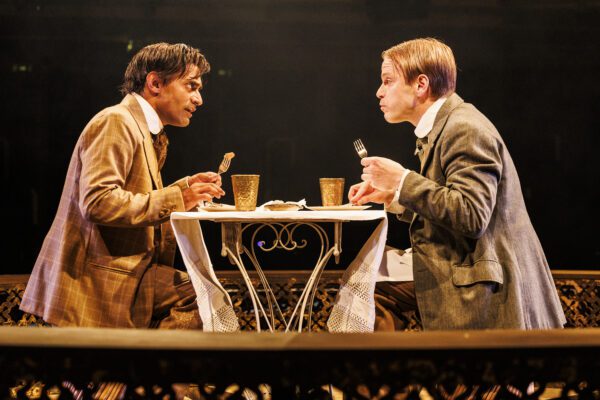Great Expectations in the Raj: In conversation with Tanika Gupta
By Erin Osman

Since 1917, there have been 28 stage, film, and TV adaptations of Charles Dickens’s Great Expectations. You might well be forgiven for asking if there was really a need for more. Yet, Tanika Gupta’s rewriting of this literary classic – an exploration of class, colonialism, and partition – feels especially pertinent.
Set in Bengal in 1899, at the very height of the British Empire, this adaptation is far removed from its original setting in Victorian London. Here, Dickens is transported to the Raj, with the play exposing the many colonial issues caused by the British during this time.
The play explores the ways in which British colonialism functioned in Bengal: through poverty, religious tensions, human rights violations, Opium, and the erasing of cultural identity through the encouragement of an idealised “British way”. While the familiar classic sees Dickens deftly explore the theme of British class, Tanika Gupta’s play feels far more nuanced, as Pip, re-named Pipli (played by Esh Alladi), navigates both class injustice and his life under British colonial rule.
After a chance encounter with an escaped convict named Malik (brilliantly performed by Andrew French), Pipli’s instinctual kindness towards him seems to be endlessly repaid. A secret benefactor sponsors Pipli’s move to Calcutta, out of his poverty and away from his abusive sister.
Pipli is given a private tutor, wears “English” clothes, and begins to seem higher-class, forming relationships within colonial circles. His roommate, Herbert Pocket (Giles Cooper), teaches him how to use his knife and fork, and how to behave like an English gentleman in colonial India. But in this process Pipli loses sight of his own cultural identity, becoming ashamed of his family and of the person he used to be.

The play is lengthy. It runs at two hours and fifty minutes, and is quite thematically ambitious, covering a range of complex and hard-hitting issues. Yet, thanks to the great directing by Pooja Ghai, it doesn’t feel particularly overwhelming on stage. It manages to still be funny, and true to Dickens’s original.
Although my own knowledge of the Bengal partition of 1905 is admittedly not very expansive, I was still able to understand the central themes of the play. And what I didn’t initially understand made me want to research and understand more. I am sure this will be the same response from other audience members – which is surely a very positive thing.
Despite its macrocosmic aims, the play also still manages to retain a level of intimacy. The relationship between Pipli (Esh Alladi) and Estella (Cecilia Appiah) is complex and endearing, as is Pipli’s relationship with his family. Miss Havisham, played by Catherine Russel, is eerie and quite genuinely frightening – my friend next to me physically jumped at one point in the play.
The set design was a beautiful Indian-English hybrid. The iconic circular stage at the Royal Exchange Theatre at first took on a visibly Indian theme, featuring a kind of latticed gold archway, vibrant flowers, and gold-plated sculpture. It would then also transform into a traditional English setting, featuring a grandfather clock and a chandelier descending from the ceiling.
I spoke to writer Tanika Gupta after seeing the play, to ask her a bit more about what inspired her re-imagining of the Dickens classic. She told me how she had always loved the novel, ever since she was a child – what especially inspired her was this idea of going “from rags to riches and back to rags again.”

Gupta also described the importance of Dickens today, and how “his themes of poverty and class and deprivation and hierarchy are so present in today’s society.” And, therefore, how adapting these classics can always give us something fresh to look at.
She spoke particularly about the character Magwitch, who in her version is renamed Malik, and about how he is basically a recidivist. “Someone who is in and out of jail all the time […] he is labelled as a hardened criminal and feels there is nothing he can do to change his life.” Gupta observes how today, very little has changed. “Our prisons are full of people who are very badly treated,” and by the end, “there is little change in their behaviour. They just go out and commit the same crimes because there are no support mechanisms for them.”
I also asked Gupta about the other presentations of characters in her Great Expectations. Miss Havisham, for instance, she described as a kind of representation, an embodiment of British colonial rule. A “privileged, entitled woman, who has wealth beyond belief” – the grotesqueness of her character represents the decaying nature of colonial England.
While story and entertainment are always at the core of Gupta’s writing, there is an obviously political element to this play. Interestingly, Gupta says, often people “don’t like it when you put too much politics in” but, for her, playwriting and politics are inseparable. “Times have changed” she says, “this is my perspective.”
Tanika Gupta’s other plays (The Empress and her adaptation of A Doll’s House) now feature in the GCSE curriculum. But despite this obvious step forward, the problem is “whether or not the teachers chose it to study.” With a serious lack of resources and funds, teachers are forced to teach only on the material that they already know how to teach – whose authors are almost always men, rich, and white.
However, not all hope is lost. Gupta describes her partnership with Bloomsbury in their ‘Literature in Colour’ initiative, “where they are giving free texts to schools to get them to do the play.” Gupta herself has seen how more and more children are coming to watch her plays, which then encourages teachers to teach them. Although she acknowledges that “it will take a while before it us up and running properly,” this to me signifies a really positive, and necessary, turn in direction for the future of teaching, education, and theatre.
Tanika Gupta’s adaptation of Charles Dickens’s Great Expectation is running from September 8 to October 7. With an impressive cast and production team, and tickets starting from just ten pounds, I would highly recommend a watch.







